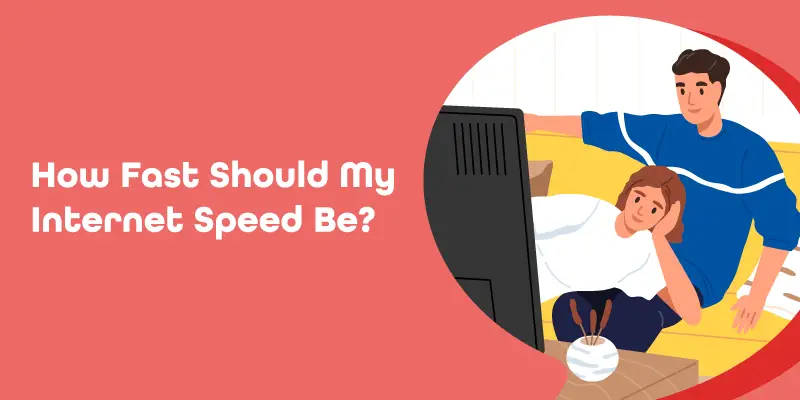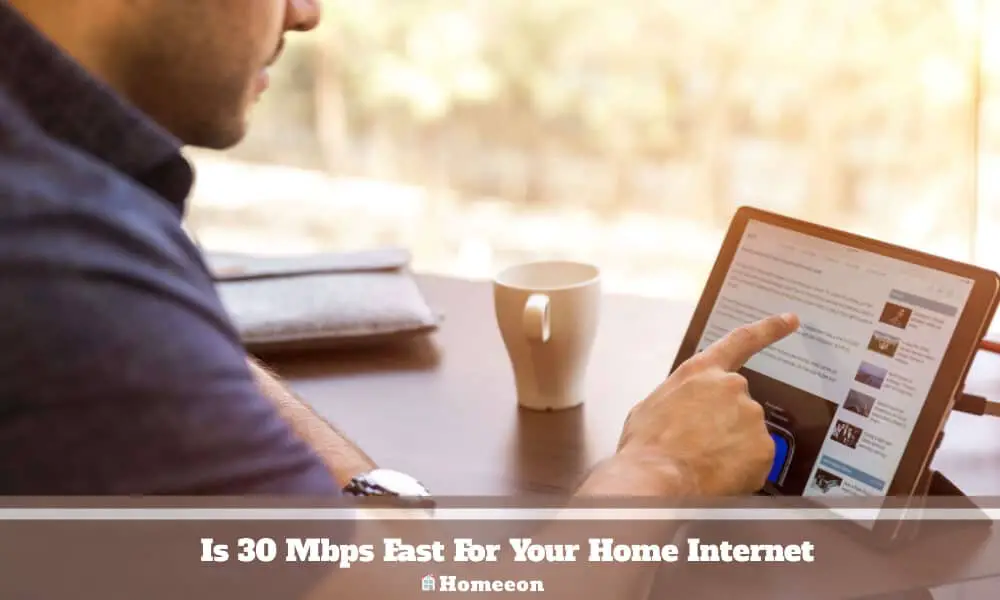Last Updated on August 9, 2023 By Emma W. Thomas
A 30 Mbps internet speed is considered good as home internet for basic browsing, video streaming, and light online activities. However, it may struggle with multiple devices or high-definition streaming. For smoother performance with more devices, consider higher speeds, especially for modern demands.
Is 30 Mbps Fast For Your Home Internet?
A download speed of 30 Mbps (megabits per second) for home internet is considered moderate and suitable for a range of online activities. Here’s a breakdown of what you can do with this speed:
- Browsing: Basic web browsing, checking emails, and social media use require minimal bandwidth. 30 Mbps is more than sufficient for these tasks.
- Video Streaming: You can comfortably stream standard-definition (SD) videos on platforms like Netflix, YouTube, or Hulu. However, if you intend to stream high-definition (HD) content, you might experience buffering or quality drops, especially if multiple devices are connected simultaneously.
- Online Gaming: Casual online gaming should work well, but more demanding games might experience lag, especially in multiplayer scenarios. For smoother gaming experiences, higher speeds are recommended.
- Video Calls: Video calls on platforms like Zoom or Skype typically require around 1-3 Mbps for decent quality. With 30 Mbps, you can easily handle video conferencing without issues.
- Downloading and Uploading: Downloading files will be reasonably fast, and uploading files to cloud services or sending emails with attachments should also be smooth.
What internet speed do you need?
| Internet Activities | Recommended Speed |
|---|---|
| Web Browsing | 1-10 Mbps |
| Video Streaming (SD) | 3-5 Mbps |
| Video Streaming (HD) | 5-10 Mbps |
| Video Streaming (4K) | 25 Mbps |
| Online Gaming | 3-10 Mbps |
| Video Conferencing | 5-10 Mbps |
| Downloading Large Files | 20-50 Mbps |
| Uploading Files | 5-20 Mbps |
| Smart Home Devices | 10-25 Mbps |
| Multiple Users/Devices | 50+ Mbps |
Internet Speed Jargon Explained

There are some popular terms used when describing internet speed that you need to understand for you to know what exactly you are settling for. Here are the most used words and what they mean:
1. Mbps- Megabits Per Second
This is the measure of internet speed. It refers to how much data can be transferred per second
2. Bandwidth
This is the measure of capacity or frequency that a network connection can handle at the moment. The higher the bandwidth, the faster your connection is
3. Download Speed
This is the measure of speed for your router to receive information from external sources
4. MBps-Megabytes Per Second
Mostly referred to as MB is used to denote the size of a specific file.
5. Router
A hardware device that facilitates a connection between your network and devices
6. Upload Speed
The measure of speed used to send information from your network to external networks
7. WIFI
A wireless connection that allows you to connect devices to a network without using a cable
Best Internet Speed For Streaming
Basic streaming does not require much speed, but if you need to stream in higher resolution or multiple devices, your speed requirement goes up. You need only about 5mbps to stream YouTube or Netflix in standard resolution.
If you need to stream in 4k ultra HD, you need a minimum of 25mbps. If you are going to stream using multiple devices at once, then we recommend a speed of about 50mbps. This is because streaming in 4K Ultra HD uses up all your available bandwidth. Internet speed works in such a way that when using multiple devices, each device gets a share of the speed. If you have to say, two devices and your internet speed is 30 Mbps; each device will have between 10-15 Mbps. When streaming, it is more advisable to use a hardwired connection as opposed to using WIFI. This is because WIFI may be slower and may produce less than desired results.
For the best streaming experience, use an ethernet cable to connect the streaming device to your router. When you have to stream over WIFI, ensure your streaming device is as close as possible to the router with no barriers between them. This will help you achieve a more stable connection with excellent video quality.
Best Internet Speed For Gaming
Online gaming, unlike most other activities, requires a fast upload speed. This is because, for gaming, the actions you perform on the game are uploaded to a server for other gamers to view and interact with. The minimum recommended internet speed for gaming is 8mbps when no one else is using your bandwidth. However, this speed may not give you a consistently good gaming experience.
If you want to enjoy a smooth gaming experience, we recommend getting speeds of 25mbps and above. For gaming, you also have to consider Latency which is the amount of time it takes to transfer data from one point to another. Competitive gamers are keen on minimizing latency numbers which is not a concern for most other internet users. These days, almost all wired connections don’t have latency issues.
Best Internet Speed For Gaming By System
Different gaming systems will have different internet requirements and its essential to know these speeds. Knowing the speed requirements for each system will help you estimate the recommended internet speed for your household based on your favourite gaming system. Here’s a table showing various systems and their internet speed requirements.
| Gaming System | Minimum Download Speed | Minimum Upload Speed | Minimum Recommended Household Speed |
| Computer | 3-6 Mbps | 2Mbps | 40-60 Mbps |
| Xbox one | 3 Mbps | 1Mbps | 40 Mbps |
| Play station 4 | 3 Mbps | 1Mbps | 40Mbps |
| Nintendo switch | 3 Mbps | 1Mbps | 40 Mbps |
| Nintendo Wi U | 2 Mbps | 1Mbps | 25Mbps |
How To Improve Your Internet Speed For The Best Gaming Experience
Sometimes, you might find that you have the right bandwidth, and the recommended speed for your gaming system but you are still experiencing some lag. Here are a few tips that will help you improve your gaming experience.
When you have other people using the internet as you play games, ensure your package has enough bandwidth to accommodate gaming and the other devices comfortably. Alternatively, you can try disconnecting other devices or programs connected to the internet.
Use a hardwired connection to connect your gaming device to the router as opposed to using WIFI. Using an ethernet cable may be less convenient compared to using WIFI, but it will give you the best internet for gaming.
If your only option is WIFI, ensure you get as close as possible to the router for the best and seamless connection.
Consider getting a router that’s specifically for gaming that prioritizes incoming traffic for your game. These routers separate gaming connections and other data in separate streams to minimize losing connections for gaming. When looking for a gaming router, you should look out for features such as multi-band WIFI, powerful processor and RAM.
Activate gaming mode on your D-Link router to enable your router to forward all incoming traffic to the gaming device. When playing Xbox live, it is necessary to activate game mode for the best gaming experience.
Factors To Consider When Choosing A Provider And Internet Speed

1. Your Speed Requirements
Your speed requirements will vary depending on what you need to do with your internet and the number of devices connected at a time. You need different internet speeds for gaming, streaming, and working online all of which we’ve already looked at. Internet service providers (ISPS) benefit from our desire for faster internet speeds, but they can also help to determine how much speed you need. Your provider will provide insight into how many devices can connect to a network at a given time to help you make an informed decision.
2. Internet Costs
The cost of your internet will vary depending on your usage and the plan you choose. An average American household spends around $60 per month on the Internet. For a speed of 100Mbps accommodating up to 5 devices simultaneously, you are likely to pay $40 per month. If you want faster speed, you can go for 200 Mbps connect eight devices simultaneously, and be willing to spend $55.
When choosing internet speeds, it’s a matter of how much you are willing to pay versus the speed you need. You need to be careful about some words used by ISPS when choosing your desired speed. Most providers offer packages that promise “speed up to” meaning you may get less but not more.
Everything You Need To Know About 5G
You’ve probably heard about the roll-out of 5G internet and wondered how it is going to impact internet speeds. 5G wireless connectivity promises faster mobile connectivity and in-home broadband. With 5G, you are going to get download speeds of between 150Mbps to 1Gbps to meet all your internet needs.
5G connections will give your internet service provider a run for the money, but you might also need to upgrade your routers to 5 G-friendly routers.
5G internet is still in the roll-out stage in major cities so we might have to wait a little longer before ditching our cable connection.
Conclusion
Deciding on the internet speed to go for isn’t as easy as it sounds or as your provider is making it seem. You need to factor in the number of devices used simultaneously in your home and the activities you’ll use your connection for. If you are using your internet for browsing and streaming, you won’t need much speed. But if you are looking to stream videos in 4K Ultra HD, play games online or connect multiple devices, you need more bandwidth.
It would be best if you also spent more when you want more bandwidth and speed. It is essential to analyze your speed and how often you experience connectivity loss for you to know if you are getting what you pay for. If you feel that you are paying more than you are getting, call your provider and raise the issue. You can opt to upgrade your package or move to a different ISP to get more value for your home internet. We hope that we helped you gain insight into internet speeds and you will make a more informed decision giving you value for money.
References:
https://networkshardware.com/internet-speed/30-mbps/
https://www.satelliteinternet.com/resources/what-internet-speed-do-you-need/
Emma is a graduate of Domestic Science or Family and Consumer Sciences (Home Economics) from the University of Wisconsin. She has 7 years of experience Working with the strategic section of BestBuy and now writing full-time for Homeeon.
From Managing the Home, Interiors, Cleaning, and Exteriors to Gardening and everything about Making A Home Liveable – is her passion and this Homeeon is the result of this.
Emma loves decorating her home with the best stuff found online. She cares about quality over anything and writes reviews about them here in Homeeon. Get in touch with her over Pinterest.
Keep reading her blogs.

